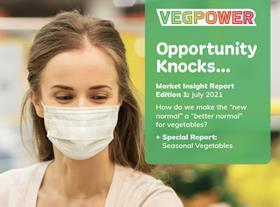
How do we make the “new normal” a “better normal” for vegetables? That’s the question the Veg Power campaign sets out to answer in the first of its market insight reports, and the 78-page document makes a compelling case for how the sector can capitalise on the current moment of opportunity.
Working with data from IRI Worldwide, backed up by figures from Nectar, Kantar, Google Trends and social media, the report lays out the argument for the industry coming together to turbocharge sales and consumption, and by extension, boost the health of the nation. As chief executive Dan Parker warns in his intro, success is far from guaranteed – “it will take extraordinary skill and commitment from the whole sector to realise its full potential,” he says – but the building blocks are there for something truly special.
Veg Power’s report, which is distributed to members, focuses on three strands – examining what’s happened since the start of the pandemic, from a consumption and shopper attitude perspective; identifying which changes are most likely to last; and proposing a series of actions to enable the sector to capitalise.
Pandemic trends
Looking at the pandemic specifically, the report notes that there have been four key shifts in behaviour, namely more food consumed at home, greater online shopping, a desire to buy more locally produced food, and consumers thinking deeply about what they put in their bodies. As Tesco produce buying manager Emma Richards writes in the report: “Shoppers are buying more vegetables, fruit and salad than at any point in the past 20 years as a result of having more time on their hands to cook, but also in order to eat more healthily during these challenging times.”
These changes have had a huge impact on veg sales. According to IRI figures, in the year of 15 March 2020 to 7 March 2021, sales of fresh, frozen and canned veg rose 9.7, 15.5 and 8.2 per cent respectively compared to the previous 12 months.
All well and good, but can it last, or is it just a blip? Veg Power believes there are four strong opportunities for the sector to capitalise on, namely home workers continuing to prepare meals, the rise of online shopping, a greater appetite for local shopping, and the growth in so-called ‘conscious consumerism’.
The latter of these factors was on the rise even before Covid, but has been brought into sharp focus in the Covid era as people hone in on the wellbeing of themselves, their community and the wider environment. “At least to some extent, this has translated into an increased interest in veg,” the report states. “With the door more open than before, now is the time for us to push hard. We must establish vegetables as the aspirational peak of conscious consumerism.”
However, to seize on this and other opportunities, veg needs to “break through the inconvenience barrier”, a key point of friction for the category. “As well as developing more convenient formats, we need to inspire people with quick and easy mealtime ideas. We also need to stimulate learned behaviours, like cooking extra veg and keeping it in the fridge to use later.”
People also need to be given useful information, plugging knowledge gaps about seasonality and the environmental benefits of eating more veg, all backed with promotional activity that will help change buying behaviour. This could include working closely with retailers to increase veg’s visibility at point of sale, creating bundled offers with complementary brands, developing content that puts veg at the heart of more eating occasions, and trialling mechanisms that reward shoppers for buying veg both in store and online. In short, a holistic approach.
The report stresses that a lasting impact of the pandemic will be the chance for many middle-class managers to work from home more often, eat more healthily and buy more veg. But that in itself is not enough: “If we wish to drive truly significant growth whilst addressing the country’s health and dietary crises, we cannot shy away from the millions more who won’t have these same chances to ‘build back better’.”
It’s not the path of least resistance, but rather a road of challenge and opportunity.
The next report will update on these trends and focus on the vegetable habits of lower-income families with a household income of £15,000-£30,000. To find out more about Veg Power’s work and how to become a member, email dan.parker@vegpower.org.uk.



